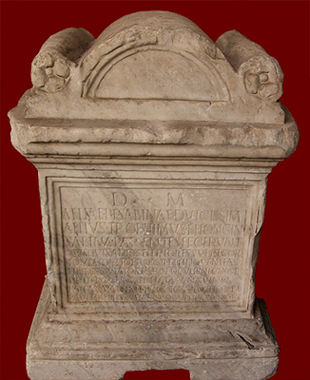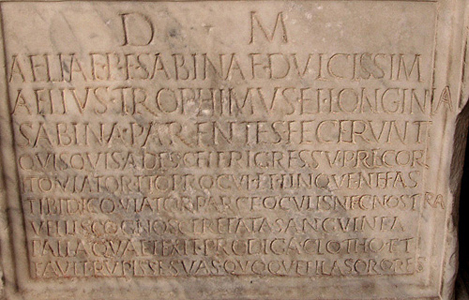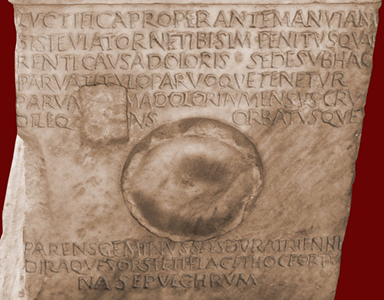
Funerary altar, marble, Rome, 117-138 CE

This small funerary altar, found in Rome, was set up for a three-year-old girl, Aelia Sabina, by her parents during the Hadrianic era (117-38 CE). Her father, Publius Aelius Trophimus, was a freedman of the emperor Hadrian. He is named in an inscription on an altar in Ostia illustrating scenes from Rome's foundation, dedicated to the god Mars by Publius Aelius Syneros, a freedman of Trophimus, whom he identifies as Augusti libertus and Procurator of Crete. Trophimus is one of a very small number of freedmen known to have held the important administrative post of procurator provinciae. Aelia's mother, Longinia Sabina, was probably also a freedwoman, but the proud declaration of filiation in the dedication (P[ubli] F[iliae]) clearly indicates that Aelia herself was born free. The tombstone is conventional in design, precut with a relief of a ritual pitcher (urceus) on the left side and a patera (shallow bowl for pouring libations) on the right side. Aelia's parents, however, did not treat this altar in a conventional manner (such as this funerary altar for Tiberius Claudius Corinthus, set up by his wife Valeria Donata in the second century CE). Instead, they chose to inscribe an elaborate eleven-line poem in dactylic hexameter after the opening dedication. Since the small altar could not accommodate the lengthy inscription, the poetic lines were disregarded (the Latin transcription below restores them) and the poem ran over onto one side of the altar (see images below). The incongruity between the stone and its inscription is matched by the contrast between the poem's high-flown poetic diction and mythological allusions and the tiny occupant of the tomb. This monument erected by Trophimus and Longinia Sabina uses poetry to convey the depth of their grief at the loss of their daughter in the same way that another second-century CE sarcophagus for a child uses visual imagery.


AELIAE P[ubli] F[iliae] SABINAE DVLCISSIM[ae]
1 Quisquis ades, celeri gressu, precor, ito viator,
ito procul et linque nefas, tibi dico, viator.
Parce oculis nec nostra vellis cognoscere fata,
sanguinea
palla quae
texit
prodiga
Clotho
quae
texit
prodiga
Clotho
5 et favit
rupisse suas
quoque
fila
sorores
luctifica properante manu. Iam siste, viator,
ne tibi sim penitus quae/renti causa doloris.
Sede sub hac parva titulo parvoque tenetur
parva [ani]ma
dolor inmensus,
cru/dileq[ue
fu]nus,
inmensus,
cru/dileq[ue
fu]nus,
10orbatusque
parens geminus,
geminus, spes
spes dura
trienni,
dura
trienni,
Click on the underlined words for translation aids and commentary, which will appear in a small window. Click on the arrow icons
( ) in the text for links to related images and information.
) in the text for links to related images and information.